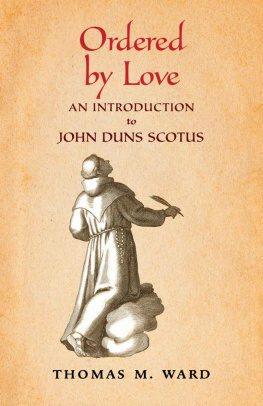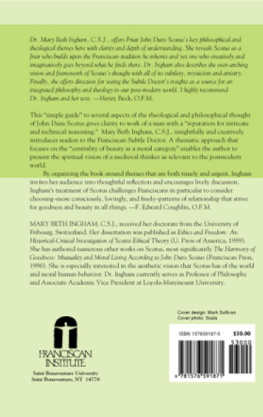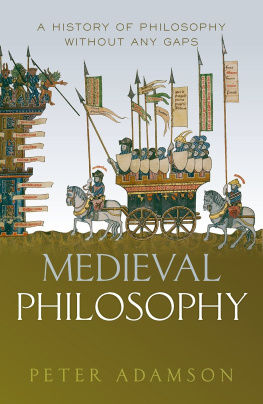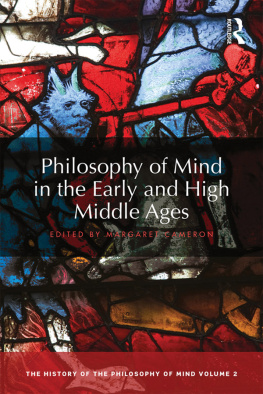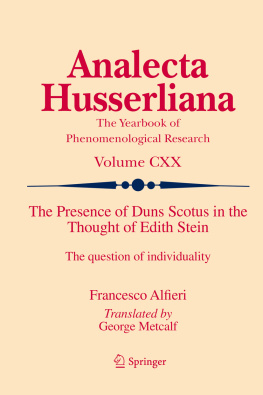Thomas Ward - Ordered by Love: An Introduction to John Duns Scotus
Here you can read online Thomas Ward - Ordered by Love: An Introduction to John Duns Scotus full text of the book (entire story) in english for free. Download pdf and epub, get meaning, cover and reviews about this ebook. year: 2022, publisher: Angelico Press, genre: Religion. Description of the work, (preface) as well as reviews are available. Best literature library LitArk.com created for fans of good reading and offers a wide selection of genres:
Romance novel
Science fiction
Adventure
Detective
Science
History
Home and family
Prose
Art
Politics
Computer
Non-fiction
Religion
Business
Children
Humor
Choose a favorite category and find really read worthwhile books. Enjoy immersion in the world of imagination, feel the emotions of the characters or learn something new for yourself, make an fascinating discovery.
- Book:Ordered by Love: An Introduction to John Duns Scotus
- Author:
- Publisher:Angelico Press
- Genre:
- Year:2022
- Rating:4 / 5
- Favourites:Add to favourites
- Your mark:
- 80
- 1
- 2
- 3
- 4
- 5
Ordered by Love: An Introduction to John Duns Scotus: summary, description and annotation
We offer to read an annotation, description, summary or preface (depends on what the author of the book "Ordered by Love: An Introduction to John Duns Scotus" wrote himself). If you haven't found the necessary information about the book — write in the comments, we will try to find it.
Thomas Ward: author's other books
Who wrote Ordered by Love: An Introduction to John Duns Scotus? Find out the surname, the name of the author of the book and a list of all author's works by series.
Ordered by Love: An Introduction to John Duns Scotus — read online for free the complete book (whole text) full work
Below is the text of the book, divided by pages. System saving the place of the last page read, allows you to conveniently read the book "Ordered by Love: An Introduction to John Duns Scotus" online for free, without having to search again every time where you left off. Put a bookmark, and you can go to the page where you finished reading at any time.
Font size:
Interval:
Bookmark:
ORDERED BY LOVE

First published in the USA
by Angelico Press 2022
Copyright Thomas M. Ward 2022
All rights reserved:
No part of this book may be reproduced or transmitted,
in any form or by any means, without permission
For information, address:
Angelico Press, Ltd.
169 Monitor St.
Brooklyn, NY 11222
www.angelicopress.com
paper 978-1-62138-881-4
cloth 978-1-62138-882-1
ebook 978-1-62138-883-8
Book and cover design
by Michael Schrauzer
To the Gentlemen of Waco Frassati
TABLE OF CONTENTS
Preface
THIS BOOK IS AN INTRODUCTION TO THE THOUGHT OF JOHN DUNS SCOTUS. IT IS FOR ALL readers with any degree of interest in this enigmatic medieval Franciscan friar. Scholars will find some original scholarship here, if they have eyes to see. But I havent written it primarily for scholars, or for the sake of originality. Ive written it to present to a wider audience the Blessed John Ive come to know and love over the last two decades. Instead of an overview of everything he wrote about, Ive opted for a narrower focus, the topics curated to present the heart of his philosophical and theological outlook. In lieu of footnotes or a bibliography, I have included an appendix which discusses primary and secondary readings relevant to each chapter. In the same appendix I recom- mend additional readings to those inspired to deepen their understanding of Scotus.
Chapter 1 makes the case for taking Scotus seriously, situates Scotus in his medieval Scholastic milieu, and offers some speculation about why he is less read and less admired than he should be. Chapter 2 offers a sketch of Scotuss philosophical arguments for Gods existence. Chapter 3 discusses Scotuss controversial view about how our words and concepts apply to God, and argues that his view should not be controversial. Chapter 4 offers Scotuss answer to what I call the Biggest Big Question: not why is there something rather than nothing? but why are things such as they are? His answer focuses on the relationship between Gods nature and His radical freedom with respect to any possible creature. Chapter 5 focuses more directly on the created world, discussing Scotuss realism about natures and his distinctive take on Aristotles idea that material objects are composites of matter and form. Chapter 6 examines the reasoning behind Scotuss most famous philosophical view, that each individual has its own individuating entity: a thisness or haecceity. Chapter 7 is about teleology, or the view that natural things act for the sake of ends; it examines Scotuss understanding of teleology in the light of his emphasis on Gods freedom. Chapter 8 considers Scotuss understanding of human freedom, with a special focus on his view that the will has two fundamental affections: an affection for justice and an affection for what is personally advantageous. Chapter 9 considers the virtues that perfect our human nature. And Chapter 10 reflects with Scotus on two perfect human beings, Jesus and Mary. I have written the book as a unified whole, moving from God to creatures and back to God roughly following Scotuss own order of exposition but those who prefer to choose their own adventure will discover that each chapter can, more or less, be read independently of the others.
Two questions have guided my writing: what does Scotus think, and why should anyone care? The book was finished when, for every aspect of Scotuss thought I discuss, I felt confident I had given good (or good enough) answers to both questions. By answering the second question to my own satisfaction I fulfilled a personal vow I made shortly after publishing my first, and very academic, book on Scotus. A reviewer of that book, expressing no disagreement with my conclusions, asked in print whether all the painstaking work of interpreting such a difficult thinker as Scotus was worth the effort. I printed out a quotation from his review and taped it above my desk. I determined someday to write a book on Scotus that made it clear why the work really is worth it. Somehow I knew that to pull it off I would need to write as much from the heart as from the mind. This book is the fruit of that labor.
Approaching Scotus
His language is frequently obscure; a maze of terms, definitions, distinctions, and objections through which it is by no means easy to thread ones way. For these reasons the study of Scotuss works was difficult; when undertaken at all, it was not carried on with the requisite thoroughness. It was hard to find a unified system in them. Not a few unsatisfactory one-sided or even wrong opinions about him were circulated and passed on unchallenged from mouth to mouth and from book to book, growing more erroneous as they went. Nevertheless, there is in Scotuss teaching a rounded-out system.
The Catholic Encyclopedia
Yet ah! this air I gather and I releaseHe lived on; these weeds and waters, these walls are whatHe haunted who of all men most sways my spirits to peace;Of realty the rarest-veind unraveller; a notRivalled insight, be rival Italy or Greece;Who fired France for Mary without spot.
Gerard Manley Hopkins, Duns Scotuss Oxford
NEARLY A SAINT
At the Franciscan monastery in Izamal, Yucatn, Mexico, there is a painting of Blessed John Duns Scotus in which he has grown some eagles wings, wings which associate him with St. John the Evangelist, whose sign is the eagle. After St. John himself, few have peered as deeply into the Logos of God as this other John, from Duns, Scotland, who was born in 1265 and died in 1308. I do not know why Bl. John is not another St. John. For some time in the first half of the twentieth century, things seemed headed in the direction of sainthood. The Scotistic Commission was set up at the Vatican in the hope that he would be canonizable just as soon as authoritative editions of his authentic texts could be produced. But the Commission drags on, and even 1993 about fifty years after the Commission got going, and the year of Scotuss beatification feels like a long time ago. Yet at his beatification Pope St. John Paul II praised him with great praise, declaring Scotus the Defender of the Immaculate Conception and the Minstrel of the Incarnation. So while I hope there is more honor in store for him from the Church Militant, in the meantime Im writing this book to help others see something of both the brilliance and the faithfulness of one of the little saints of the little brothers of St. Francis.
Scotus is worth studying, not because he got everything right, but because he got a few important things right, and also because he is a model for Christian intellectuals seeking to put their intellectual labors at Gods service. He was ambitious in his efforts, but always deferential to the Churchs teaching. He is an heir of that great Christian intellectual tradition according to which truth is unified, whether we arrive at it by reason or by revelation, and all truth is Gods truth. And where he thought he could see the way through to a thorough defense, or proof, of any theological or philosophical proposition, he pressed it with unmatched logical rigor, earning the title realtys rarest-veind unraveller from his nineteenth-century Jesuit admirer the poet Gerard Manley Hopkins; and Subtle Doctor from those in his own day.
While he is rightly associated with subtlety of thought and logical rigor, another quality marks what little we know of his life, and that is faithfulness, a faithfulness expressed in both deference and boldness. The deference is evident in his written work at those points at which he defers to the Churchs teaching when he comes up against questions to which his portion of rationality gives him no definite answer. For example, he did not think that the immortality of the soul could be proved by philosophy, yet he accepted immortality because the Church teaches it. Again, while he believed in the doctrine of transubstantiation because the Church teaches it, he thought that the purely biblical and philosophical evidence, while consistent with transubstantiation, more strongly supported a different understanding of Eucharistic real presence.
Next pageFont size:
Interval:
Bookmark:
Similar books «Ordered by Love: An Introduction to John Duns Scotus»
Look at similar books to Ordered by Love: An Introduction to John Duns Scotus. We have selected literature similar in name and meaning in the hope of providing readers with more options to find new, interesting, not yet read works.
Discussion, reviews of the book Ordered by Love: An Introduction to John Duns Scotus and just readers' own opinions. Leave your comments, write what you think about the work, its meaning or the main characters. Specify what exactly you liked and what you didn't like, and why you think so.

